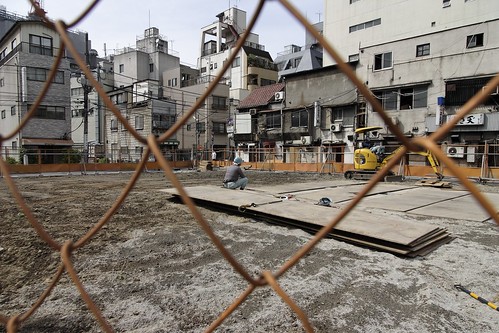It looks like fresh attention is being paid to the fact that plastic bags are among the most troublesome and pernicious forms of waste. How bad? Well, “continents of floating garbage” for a start. Think that’s an exaggeration? Well, “One plastic patch is estimated to weigh over 3 million tons and covers an area twice the size of Texas.” And how much ecological damage does it do?
The United Nations Environment Program says plastic is accountable for the deaths of more than a million seabirds and more than 100,000 marine mammals such as whales, dolphins and seals every year.

That almost certainly dwarfs any damage to cetacean populations that could be caused by, to take a far more famous issue, Japan’s “scientific” whaling program. Not to mention the yet-unknown effects that all of this plastic is likely having on fish, algae, plankton, etc. Could the collapsing fishing stocks be attributable not just to the direct action of over-fishing, but also to poisoning and choking by gargantuan amounts of plastic?
Since the plastic tends to gather in isolated and rarely trafficked patches of sea, so deep into international waters that no country even crosses path with it, much less has responsibility for it. As yet, there is no world body with either the political motivation, technology, or infrastructure necessary for embarking on what would easily be the largest cleanup project in history, and it is difficult to imagine any realistic way that such a huge mass could be removed.
Still, as hopeless as the cleanup is, at least the world is beginning to work to phase out the manufacture and use of such plastic bag, which will at least slow down the rate at which the problem worsens. An announcement earlier today that China-the world’s largest and most polluting nation-will be drastically cutting plastic bag usage is an important step.
As in most countries that have attempted to tackle the problems causes by plastic bag waste, China will primarily be relying not on a total ban on their use, but a requirement that stores no longer give them out free with purchases, but charge extra for them. It is hoped that imposing a surcharge on the bags will encourage customers to bring their own environmentally friendly reusable bags when they go shopping, as has been the case in other countries.
While, as far as I know, Bangladesh is the only country which has as yet completely banned the distribution of plastic bags, a number of countries have imposed bag surcharges similar to the one proposed for China. Taiwan introduced a charge equivalent to something like 5-7 US cents per bag, Singapore has a similar system, and Ireland-an island about twice the size of Taiwan, and formerly a consumer of over 1.2 BILLION plastic bags per year-has imposed a 15 cents/bag fee that is credited with reducing their use by 90%. Other countries in Europe, most likely starting with Ireland’s next-door neighbor of Britain, will likely follow.
Some other countries, such as Japan, have been relying on voluntary conservation to combat plastic bag proliferation. Although some Japanese supermarkets have taken the bold step of simply not having bags at all, they are still given away for free in most businesses. However, convenience stores recently began offering a discount of several yen to customers who refuse a plastic bag. Although the clerk is officially supposed to ask customers if they need a bag, in my experience they almost never do, and simply give them out habitually.
Although I have yet to hear a serious proposal to either ban or charge for plastic bags in the heavy consuming United States, I have recently noticed two well-meant but minor initiatives. The first was at the New York University campus bookstore and computer stores, where if you refuse a plastic bag they give you a token you throw into one of four or five bins near the exit, each one representing a charity. Each token pledges a 5 cents donation to that charity. The other was a sign at my local A&P Supermarket, promising a discount of a few cents for customers who bring their own bags. Unfortunately, this will certainly prove as ineffectual as the convenience store initiative in Japan, particularly since I only saw the sign by the exit, in an area not even visible from the cash register/bagging area.
Will these various measures have a major effect on the plastic bag problem? The answer to that thankfully seems to be a yes-but a qualified yes. It is still to early to know how much ecological damage the vast amounts of plastic already in the ocean have caused, or will cause in the future. And despite movement towards curbing the future growth of the “continents of floating garbage,” we may never be able to get rid of them.
For more information on the oceanic plastics quandary, have a look at this short documentary, filmed on location in the Pacific Ocean.



